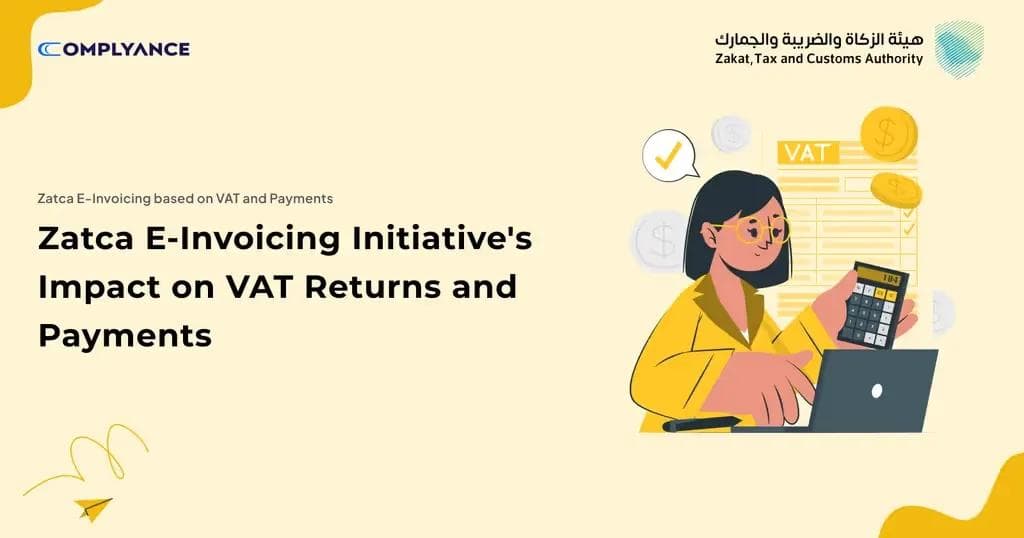Zatca E-Invoicing Initiative's Impact on VAT Returns and Payments
Discover the impact of the ZATCA e-Invoicing Initiative on VAT in Saudi Arabia. Stay compliant and ensure smooth financial operations with our guide.

Table of Contents
Zatca E-Invoicing Initiative's Impact on VAT Returns and Payments
In today's digital world, technology is transforming the way we do business. One such initiative that has gained attention is the Zatca E-Invoicing Initiative. This initiative can have a substantial impact on how Value Added Tax (VAT) returns and payments are managed. In this blog, we'll break down the Zatca E-Invoicing Initiative and explore its effects on VAT-related processes.
What is the Zatca E-Invoicing Initiative?
The Zatca E-Invoicing Initiative is a government effort to modernize and streamline the invoicing process. Instead of traditional paper invoices, businesses are encouraged or mandated to generate, send, and receive invoices electronically through a designated platform. Zatca stands for " Zakat, Tax, and Customs Authority." which is the governing body overseeing this initiative.
The Zatca E-Invoicing Challenge
The Zatca E-Invoicing Initiative offers numerous benefits for VAT-related processes, such as accuracy, efficiency, and real-time reporting. However, it also presents businesses with the challenge of transitioning from traditional paper-based invoicing to electronic formats. This transition requires a robust and user-friendly platform to ensure seamless compliance with the initiative's requirements.
Impact on VAT Returns
VAT returns involve reporting the VAT a business has collected from its customers and paid on its purchases to the tax authorities. The Zatca E-Invoicing Initiative can influence this process in the following ways:
- Accuracy and Timeliness: E-invoicing reduces the likelihood of errors often associated with manual data entry. This means more accurate VAT calculations and reduced chances of discrepancies in returns.
- Real-time Reporting: With electronic invoices being directly shared with tax authorities, businesses can provide real-time data on their transactions. This leads to quicker and more precise VAT reporting.
- Efficiency: E-invoicing automates the invoice submission process, saving time for businesses. This efficiency extends to VAT return preparation, resulting in a smoother filing experience.
Impact on VAT Payments
VAT payments involve settling the amount of VAT owed to the tax authorities after considering input VAT (VAT paid on purchases) and output VAT (VAT collected from customers). The Zatca E-Invoicing Initiative can impact VAT payments as follows:
- Accurate Calculations: Electronic invoices help ensure that input and output VAT calculations are accurate. This accuracy prevents overpayment or underpayment of VAT, leading to more precise payment amounts.
- Reduced Tax Evasion: The real-time nature of e-invoicing allows tax authorities to monitor transactions closely. This increased oversight can help identify and deter potential tax evasion, contributing to a fairer tax system.
- Cash Flow Management: Quicker and more accurate VAT calculations mean businesses can better manage their cash flow. This is crucial for planning and allocating funds for VAT payments.
How Complyance.io Makes a Difference
Complyance has emerged as a solution designed to address the complexities of the Zatca E-Invoicing Initiative and simplify VAT compliance. Here's how Complyance.io overcomes the challenges and helps businesses navigate the new VAT landscape:
- E-Invoicing Integration: Complyance.io offers a user-friendly interface that seamlessly integrates with businesses' existing invoicing systems. It facilitates the generation, sending, and receiving of electronic invoices in accordance with Zatca's requirements.
- Automated Data Validation: One of the key challenges with e-invoicing is ensuring that the data is accurate and compliant. Complyance.io automates data validation processes, minimizing errors and reducing the risk of discrepancies in VAT returns.
- Real-time Monitoring and Reporting: Complyance.io provides real-time monitoring of transactions, allowing businesses to track their VAT-related activities. This ensures timely and accurate reporting to tax authorities, aligning with the initiative's emphasis on real-time data.
- Customizable Workflows: Each business operates uniquely. Complyance.io understands this and offers customizable workflows that cater to specific VAT compliance needs. This flexibility helps businesses adapt to the new requirements without disrupting their operations.
- Seamless VAT Payment Integration: Complyance.io goes beyond invoicing by integrating with payment systems. This enables businesses to calculate and process accurate VAT payments, preventing overpayment or underpayment.
- Compliance Advisory: Navigating the intricacies of the Zatca E-Invoicing Initiative can be overwhelming. Complyance.io offers expert guidance and advisory services to ensure businesses remain compliant and informed.
The Future of VAT Compliance
As the Zatca E-Invoicing Initiative continues to shape VAT compliance regulations, businesses need to embrace technology-driven solutions to stay competitive and compliant. Complyance innovative approach not only streamlines the VAT process but also prepares businesses for the digital future.
Conclusion
The Zatca E-Invoicing Initiative marks a significant shift in how businesses handle invoicing and, consequently, VAT-related processes. The move from paper to electronic invoices has the potential to streamline and enhance VAT return reporting and payment procedures. By embracing this initiative, businesses can experience improved accuracy, efficiency, and transparency in their VAT dealings. As e-invoicing becomes more prevalent, staying informed and adapting to these changes will be essential for businesses to thrive in the evolving digital landscape.
Related posts
Subscribe to our Newsletter
Get the latest compliance updates, e-invoicing news, and expert tips delivered to your inbox.
ABOUT COMPLYANCE
Empowering businesses to automate e-invoicing and stay compliant in 100+ countries. Our platform simplifies regulatory complexity for enterprises and fast-growing companies.
Go Live in a Week with Developer-Friendly Global E-Invoicing Platform
Complyance makes it easy for your IT/dev team to integrate once and automate E-Invoicing across 100+ countries. Built for fast deployment, field-level validation, and indirect tax accuracy—no delays, no rework.



